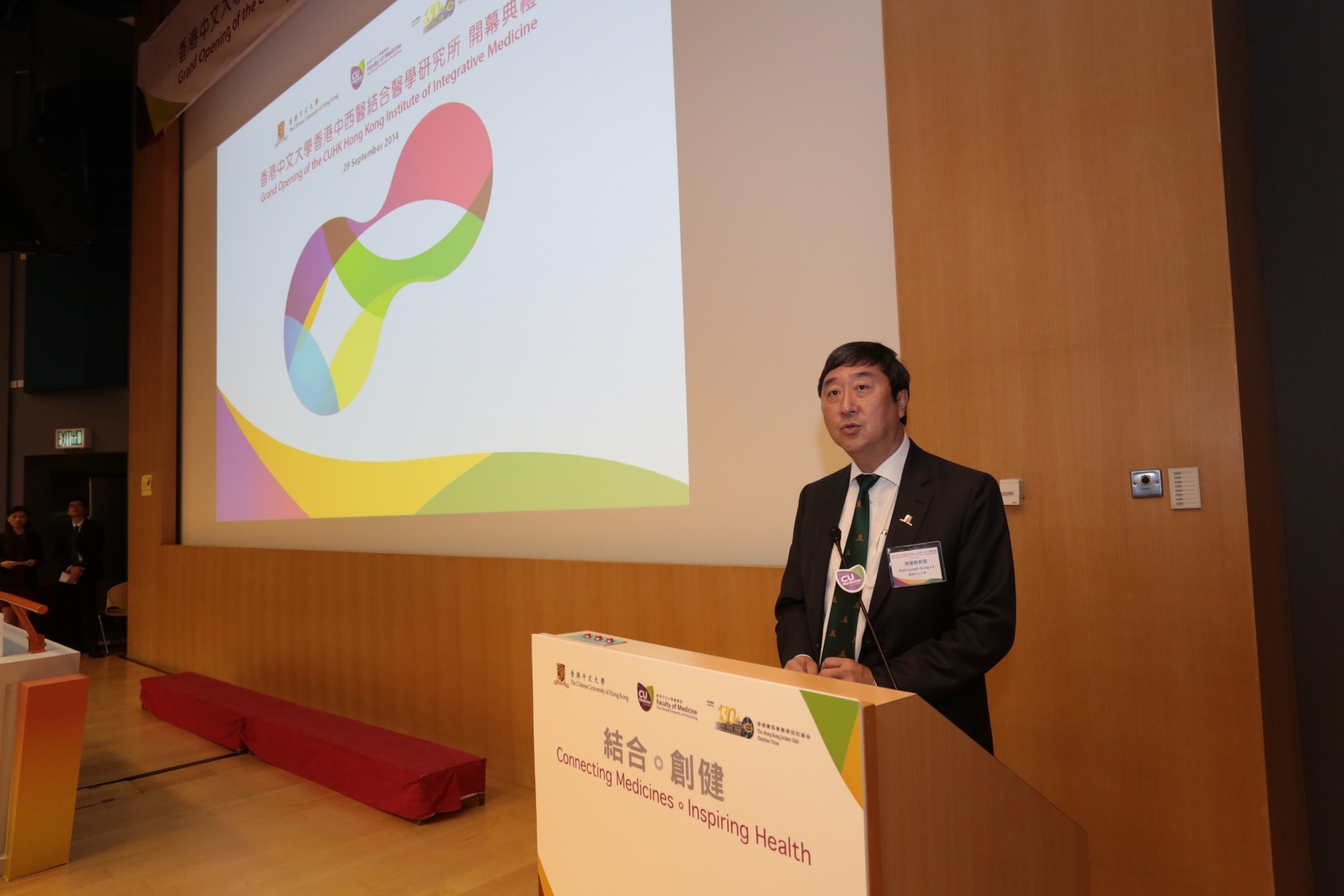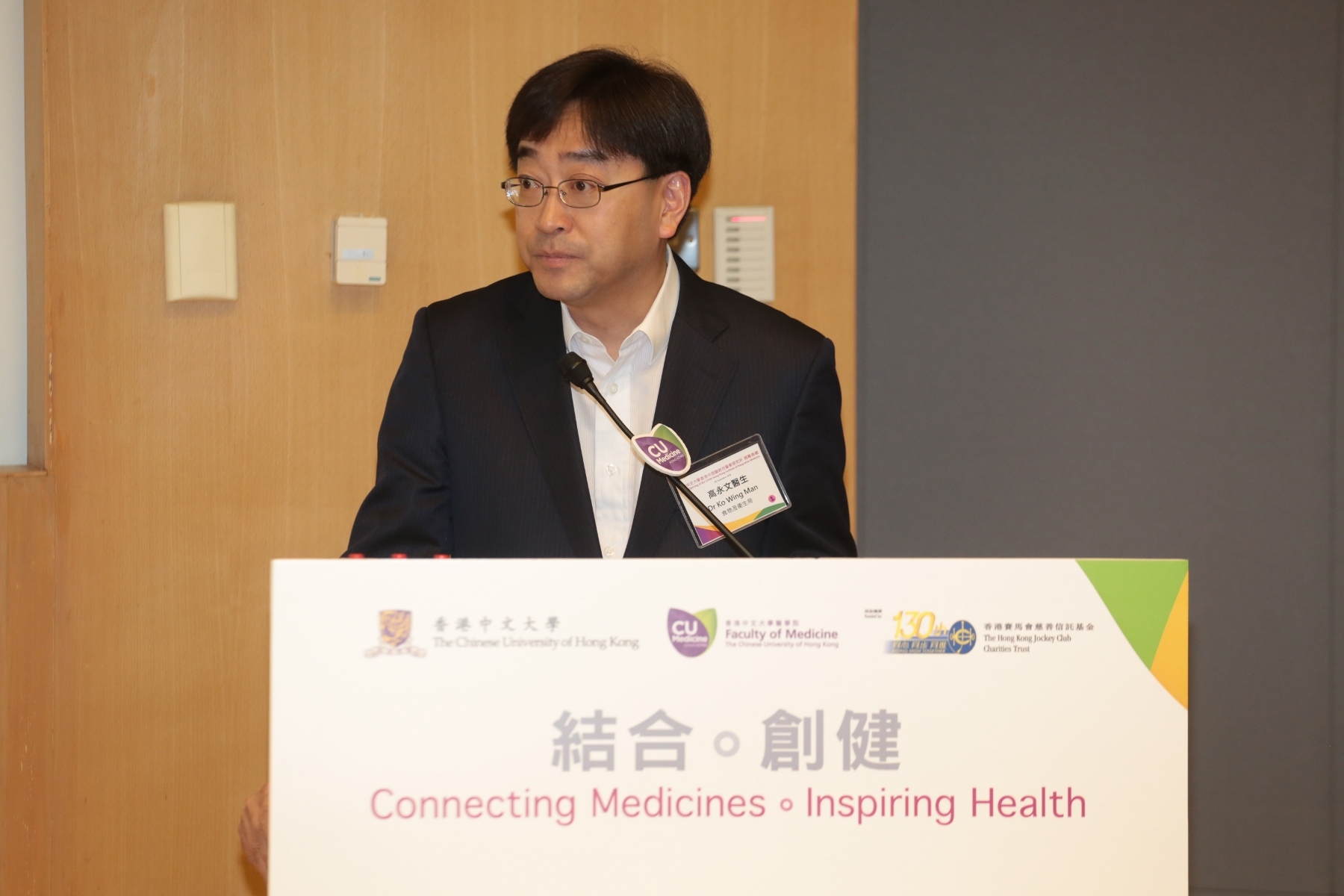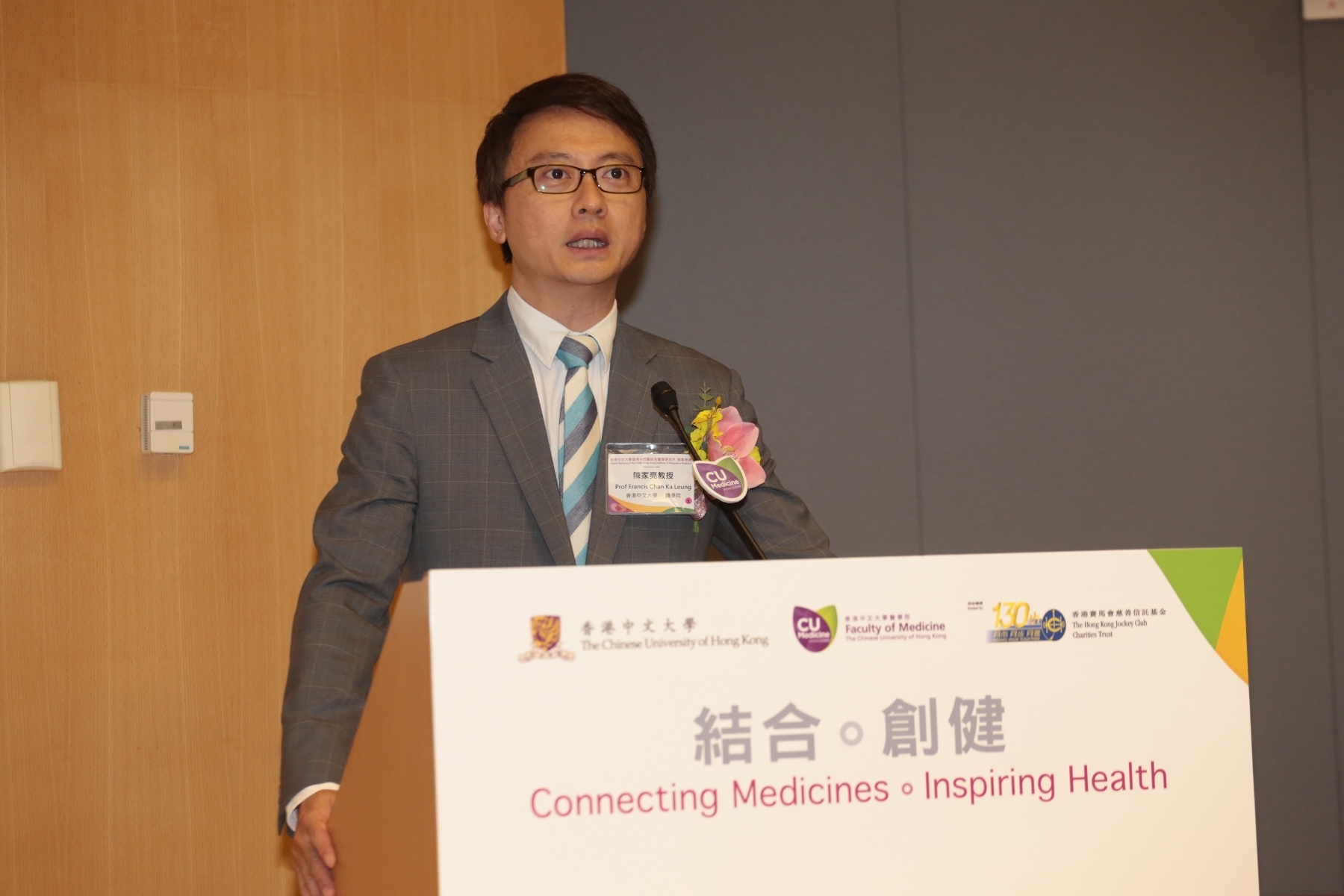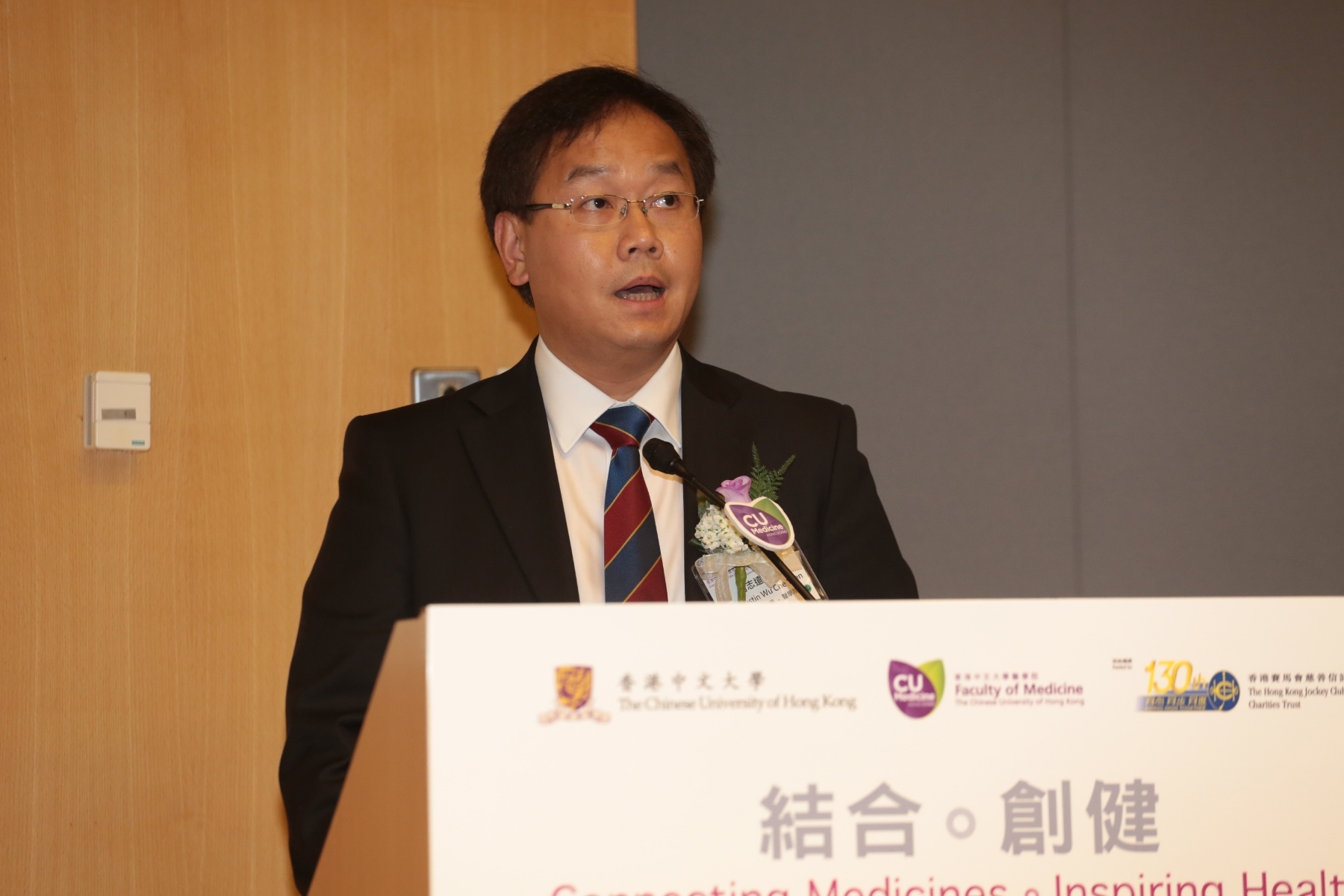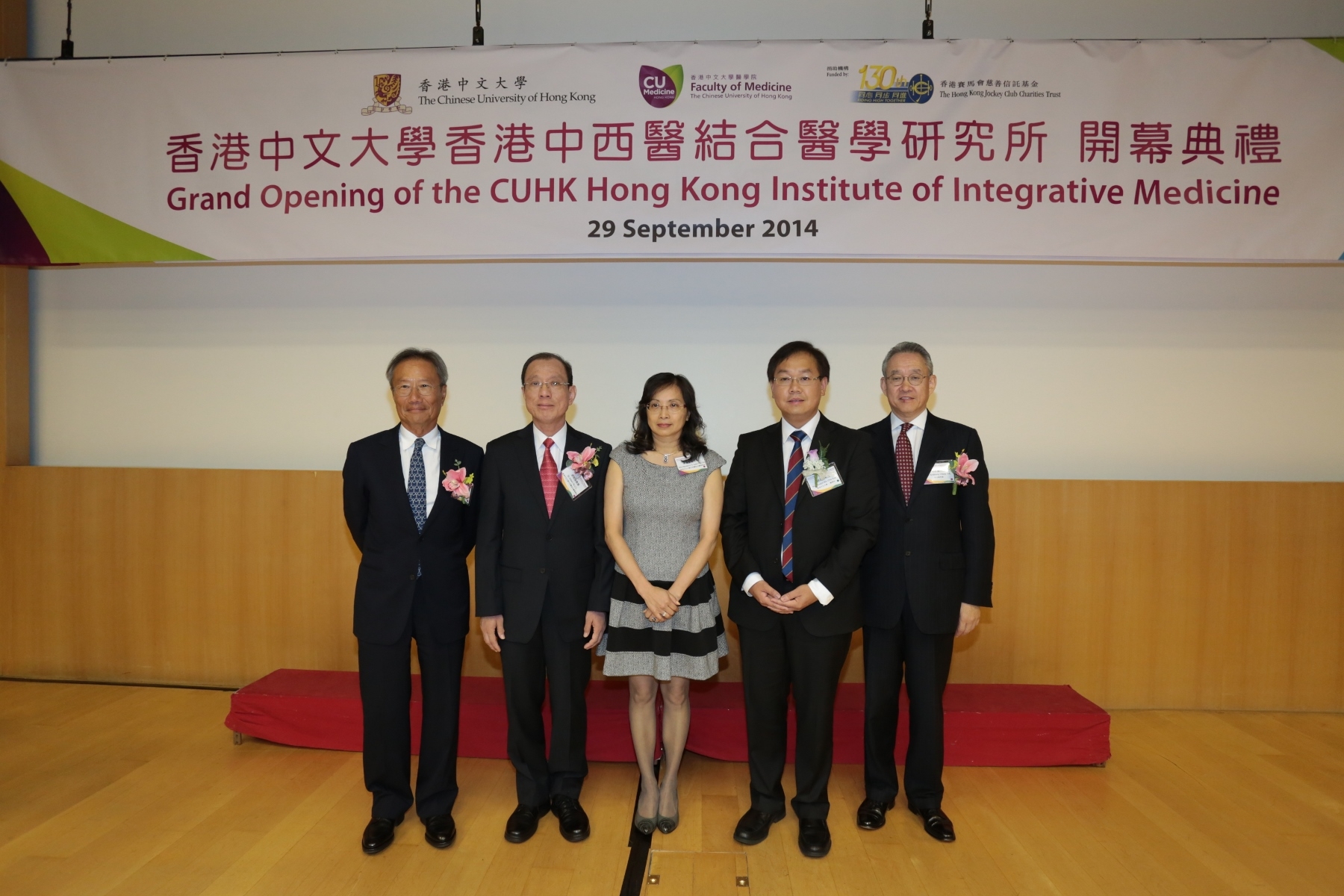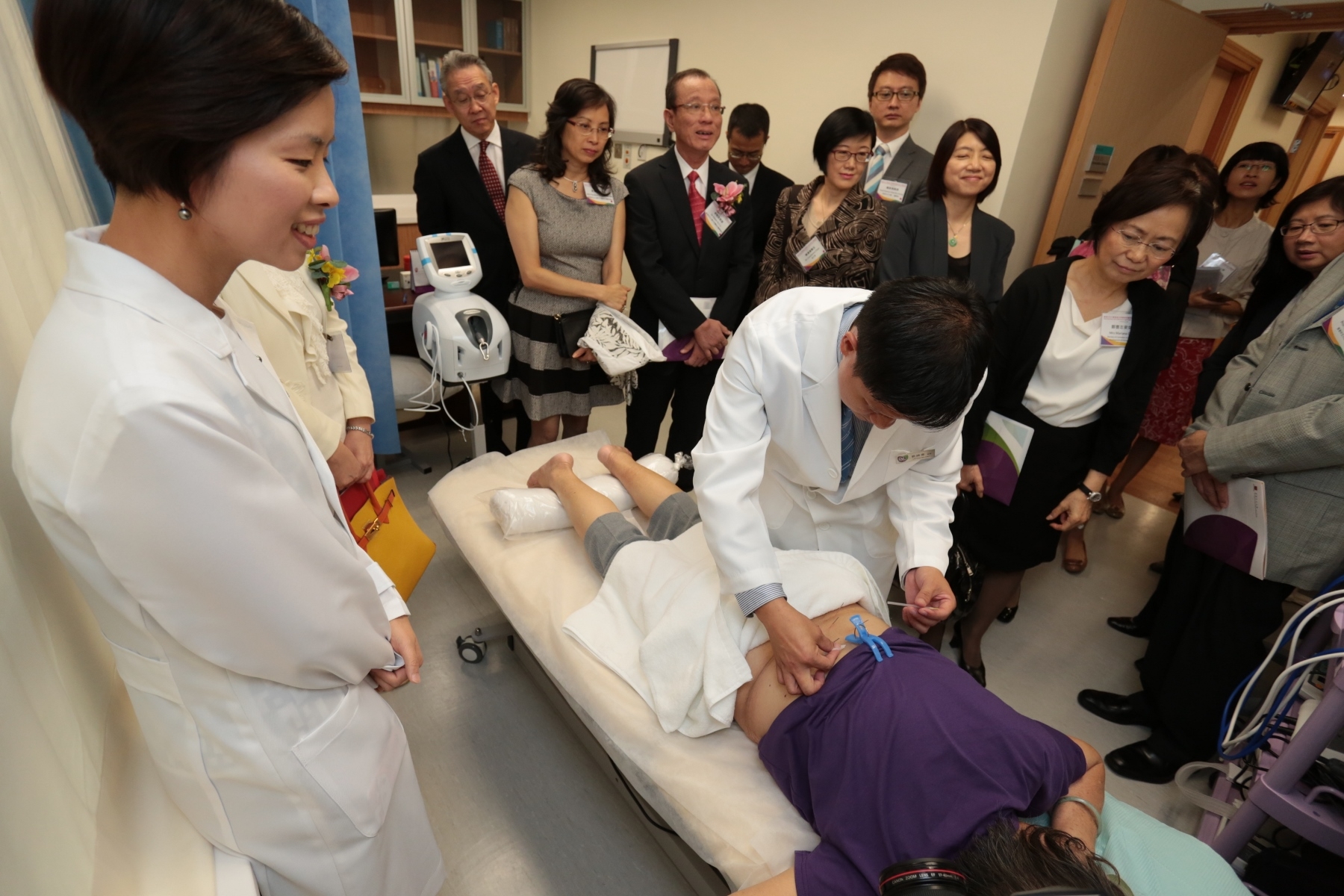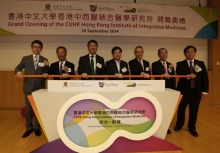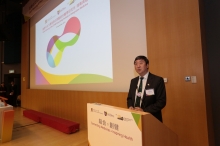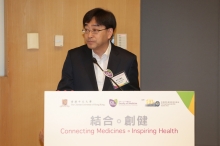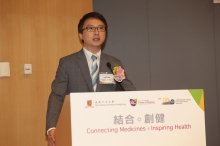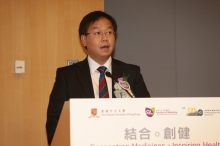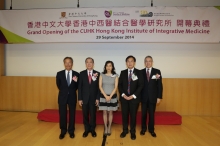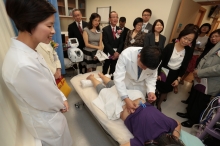CUHK
News Centre
CUHK Establishes Territory’s First Institute of Integrative Medicine to Advocate New Model of Clinical Treatment
The Chinese University of Hong Kong (CUHK) has recently established the Hong Kong Institute of Integrative Medicine (HKIIM), the first university-run institute in the city that encompasses research, clinical practice and education in the integration of Chinese and Western medicine. The inauguration ceremony was held today (29 September), officiated by Dr Ko Wing-man, Secretary for Food and Health, HKSAR Government; Prof Joseph JY Sung; Vice-Chancellor and President of CUHK; Mr Anthony WK Chow, SBS, JP, Deputy Chairman of The Hong Kong Jockey Club; Dr Edgar WK Cheng, Chairman of the Lanson Foundation; Prof Edwin CL Yu of the CUHK InteMed Fund; Prof Francis KL Chan, Dean of the Faculty of Medicine, CUHK and Prof Justin CY Wu, Director of the Hong Kong Institute of Integrative Medicine. In addition, over 200 guests and experts from the field of Integrative Medicine witnessed the establishment of a platform that promotes the integration of Chinese and Western medicine.
The use of both Chinese and Western Medicine in parallel in disease treatment is not uncommon in Hong Kong. Many patients consult both Chinese and Western medical practitioners respectively to get better treatment results. However, a safe and proven treatment model of integrative medicine, as well as a sophisticated and standard communication channel between Western and Chinese medical practitioners, has yet to be developed to achieve synergy. In view of the rising demand for integrative medicine, the Faculty of Medicine of CUHK initiated the idea of setting up an institute that encompasses research, clinical care and education about two years ago, to promote the practice of integrative medicine.
During his welcome speech, Prof. Joseph JY Sung stated, “The fundamental divergence of Chinese and Western medical practitioners’ interpretations of body constitution and of disease management actually creates room for development of integrative medicine. The Hong Kong Institute of Integrative Medicine is established with the purpose of aggregating medical experts from around the world to engage in research, clinical practice and training of integrative medicine; and thereby improving the quality of integrative medicine that will minimize disease induced human suffering.”
Through an evidence-based approach, HKIIM aims to understand and assess the effectiveness of integrative medicine in treating individual diseases. In addition, it is dedicated to applying research results in clinical practice in order to construct a safe and effective integrative medical care system that will be an exemplary model for the local and international community. Moreover, the Institute will become an important platform for exchange of integrative medical knowledge and a place of training Integrative Medicine professionals. Prof. Francis KL Chan , Dean of Faculty of Medicine of CUHK said, “As one of the world’s top 50 medical schools, the Faculty of Medicine at CUHK actively engages in various medical research while tirelessly training medical professionals. In our efforts, we incorporate elements of Integrative Medicine in our conventional medical training in order to fully equip new medical practitioners who will be well prepared to face challenges and address the health needs of the society.”
To accomplish its three missions of research, clinical services and education, HKIIM is established with two major sections: the East-West Research and Training Centre for Integrative Medicine for research and education purposes; and the Integrative Medical Centre for outpatient services. The former actively collaborates with the School of Chinese Medicine, Institute of Chinese Medicine, local and overseas institutions (ex. The University of Maryland which has a long history of over twenty years of collaboration with CUHK) in research projects on integrative medicine. The latter operates as a one-stop integrative medicine outpatient clinic that provides quality service to the general public.
Prof. Justin CY Wu, Director of HKIIM pointed out, “There are past research on Integrative Medicine but the results are scattered among various institutions and universities. Therefore, HKIIM of CUHK aims at building a platform for experienced local and overseas medical experts to engage in exchange of knowledge and ideas that will accelerate the development of medicine.” He further elaborated, “The research focus of HKIIM will be chronic diseases such as chronic pain condition, functional gastrointestinal disorder, stroke rehabilitation, etc. whose management by Western medicine alone could be limiting; but for which Chinese medicine could provide alternative treatments. In addition, HKIIM will raise the safety standard of herb-drug interaction in order to set a standard risk management model for interaction between Western and Chinese medicine.”
The establishment of HKIIM has been made possible with the generous donation from various parties, including The Hong Kong Jockey Club Charities Trust for furnishing and equipment installation of the institute; the Lanson Foundation for initial research funding; the CUHK InteMed Fund set up by the donation of Prof Edwin Yu, as well as other financial support from society. Deputy Chairman of The Hong Kong Jockey Club, Mr Anthony WK Chow said the Club has funded promotion of Traditional Chinese Medicine since 1998. “We are delighted to support the establishment of the Institute, the Institute is the first of its kind jointly managed by Chinese and Western medical practitioners, offers both Traditional Chinese and integrative medical treatment, education, research and health consultation. It helps meet the needs of different patients and facilitate personnel training,” he said.
The integration of Chinese and Western Medicine is a significant milestone in the progression of medical history. Its long-term development relies on active engagement and collaboration within the medical profession to create synergy, thereby benefitting the well-being of society.
(From left) Prof Francis KL Chan, Dean of the Faculty of Medicine, CUHK; Dr Edgar WK Cheng, Chairman of the Lanson Foundation; Prof Joseph JY Sung, Vice-Chancellor and President of CUHK; Dr Ko Wing-man, Secretary for Food and Health, HKSAR Government; Mr Anthony WK Chow, Deputy Chairman of The Hong Kong Jockey Club; Prof Edwin CL Yu, the CUHK InteMed Fund; and Prof Justin CY Wu, Director of the Hong Kong Institute of Integrative Medicine; officiate at the Grand Opening of Hong Kong Institute of Integrative Medicine (HKIIM).
Prof Francis KL Chan, Dean of the Faculty of Medicine, CUHK illustrates about the research focus and professional training of HKIIM.
Prof Justin CY Wu, Director of the Hong Kong Institute of Integrative Medicine gives an overview of HKIIM’s future development.
Prof Justin CY Wu, Director of HKIIM (2nd right) presents souvenirs to representatives of donor including Dr Edgar WK Cheng, Chairman of the Lanson Foundation; Prof Edwin CL Yu and Mrs Yu, the CUHK InteMed Fund (1st to 3rd left); and Mr Anthony WK Chow, Deputy Chairman of The Hong Kong Jockey Club (1st right).



